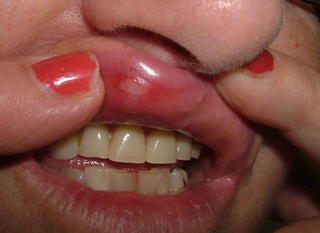
This 66 yo woman began topical imiquimod on July 27, 2005 for a biopsy proven superficial BCC of the right upper lip. One week later, she developed aphthous ulcers on the mucous membrane surface of the area just below the site treated. A literature search retrieved a reference to his occurence. This is another unexpected adverse effect. It is unclear how common this is.
Aphthous ulcers associated with imiquimod and the treatment of
actinic cheilitis.
Chakrabarty AK, Mraz S, Geisse JK, Anderson NJ.
J Am Acad Dermatol. 2005 Feb;52(2 Suppl 1):35-7.
Solano Clinical Research, Davis, California, USA. chakak3@yahoo.com
Our case series report is the first documented depiction of the
appearance of aphthous ulcers secondary to imiquimod
application. This case series presentation discusses the
underlying pathophysiology of aphthous ulcer development and
imiquimod therapy in terms of the stimulation of pro-
inflammatory cytokines, such as tumor necrosis factor alpha
(TNF-alpha). The literature review suggests more than just a
mere coincidence for the development of aphthous ulcers
subsequent to the treatment of actinic cheilitis with imiquimod
application.
To understand how IQ can stimulate this type of injury study this monograph at the following URL:
ReplyDeletehttp://www.aldara1.com/Aldara%20Monograph%20DSC.pdf
I am a 61 yo woman, dx with pre cancer, being treated with IQ on lower lip, the pain, blisters and sores are unbearable. Supposed to use two more months! Any thoughts out there?
DeleteThe usual treatment is for 30 days. However, perhaps you are not applying every day. Best to sit down with your dermatologist and have her or him explain the treatment protocol.
Delete